|
|
登载媒体:美国国立公共电台
原文链接:http://www.npr.org/templates/story/story.php?storyId=100522156
翻译方式:原创
声明:Anti-CNN原创翻译,转载请注明出处,译者,及译文链接!
Morning Edition, February 11, 2009 ·
Part of Shanghai's Jewish history is under threat from bulldozers.
2009年2月11日, 晨讯
上海部分犹太历史正受到来自推土机的威胁
In the 1930s, Shanghai was the only place in the world to offer visa-free sanctuary to Jews fleeing Nazism — 20,000 ended up in Shanghai. In 1943, the Japanese restricted them to a one-square-mile area, which became known as Little Vienna.
上世纪30年代,上海曾是世界上最后一处犹太人免遭纳粹毒手的避难地,无需签证即可入境,这里总共收留了20000名难民。1943年,日本人将他们限制在一平方英里的一处区域内,也即后来的“小维也纳”地区。
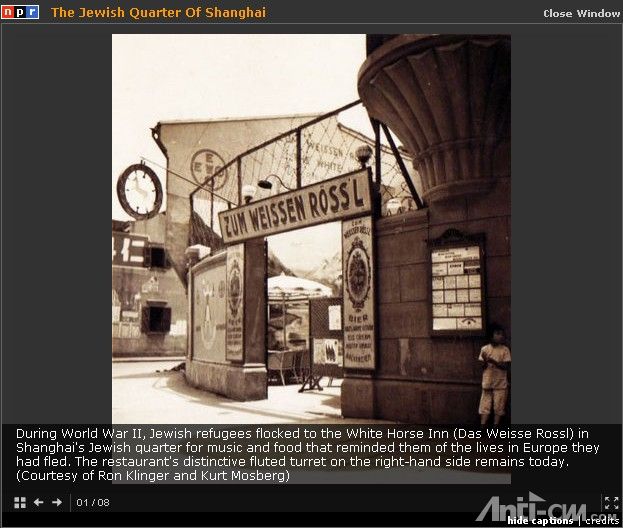
A pianist and a violinist used to play popular music for customers at the White Horse Inn, or Das Weisse Rossl. The waitresses wore dirndls — traditional Bavarian outfits — and the menu featured Wiener schnitzel.
在当时的白马旅馆,也即 Das Weisse Rossl,曾经有一位钢琴师兼小提琴手为这里用餐的人们演奏时兴的乐曲。那时的女服务员还穿着紧身连衣裙——巴伐利亚妇女的传统裙装——而煎猪排则是这里的招牌菜。
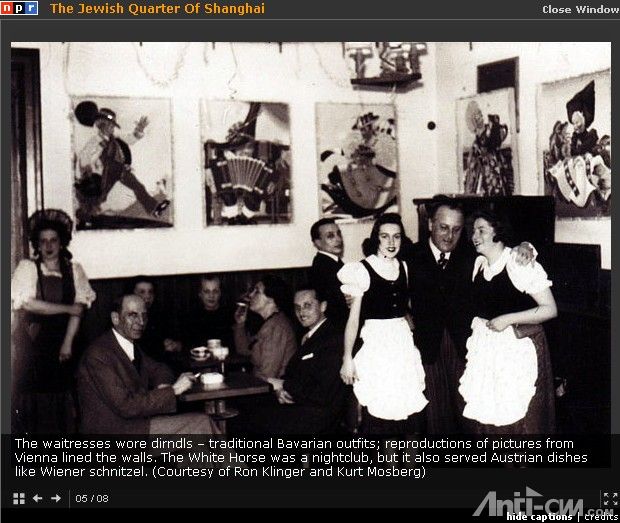
But the White Horse wasn't in Austria or Germany, it was in wartime Shanghai. And for the city's wealthier Jewish refugees, it offered a memory of homes that no longer existed.
不过,这座白马旅馆不在奥地利,也不在德国,而是在战时的上海。对于这座城市里相对更富裕的犹太难民们来说,这座旅馆让他们想起了不复存在的家园。

"My wedding party was in White Horse Inn, which was fantastic," remembers Kurt Mosberg, now 90 years old and living in Sydney. "It was mostly my friends, mostly Jewish people, about 120 people. Thinking that it was in Shanghai, it's an amazing thing, you know."
Kurt Mosberg回忆道,“我的婚礼派对就是在白马旅馆举行的,那里棒极了,”现已90高龄的他目前居住在悉尼,“那天大概来了120个人,大多数都是我的朋友,都是犹太人。要知道,想想这是在当时的上海,真是不可思议。”
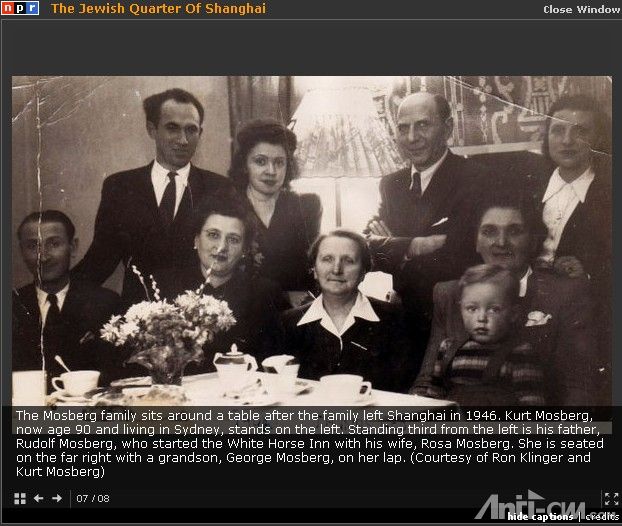
Mosberg's parents started the White Horse Inn in Shanghai in 1939 and ran it for five years as a nightclub.
1939年,Mosberg的父母在上海开办了这家白马旅馆,此后五年间将它经营成了一家夜总会。
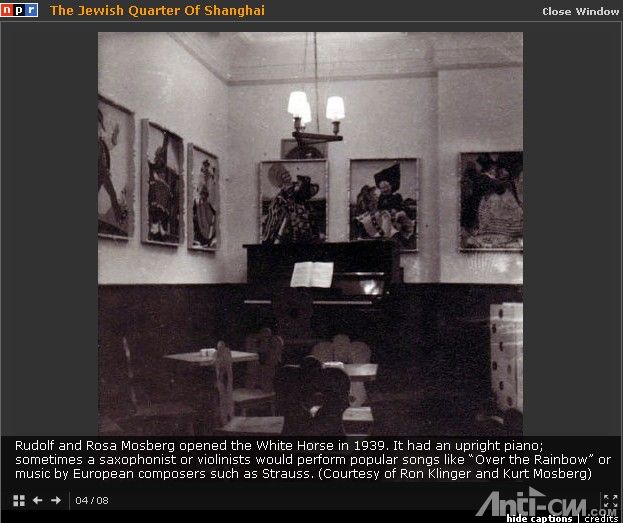
Uncovering Layers Of the Past
揭开尘封的历史
Today, the building still stands. It's easily identified by a distinctive fluted circular turret. Below that, painted on its wall is the Chinese character "to be demolished." The White Horse Inn is among a number of buildings inside the Jewish district to be knocked down to make way for a widened road.
今天,这座建筑依旧矗立着。通过楼顶那个标志性的圆形角楼(?)人们很容易就能认出它。在角楼下面的墙上,图着几个汉字“待拆”。犹太人区里有一批建筑都将为了道路拓宽而被拆除,白马旅馆便是其中之一。
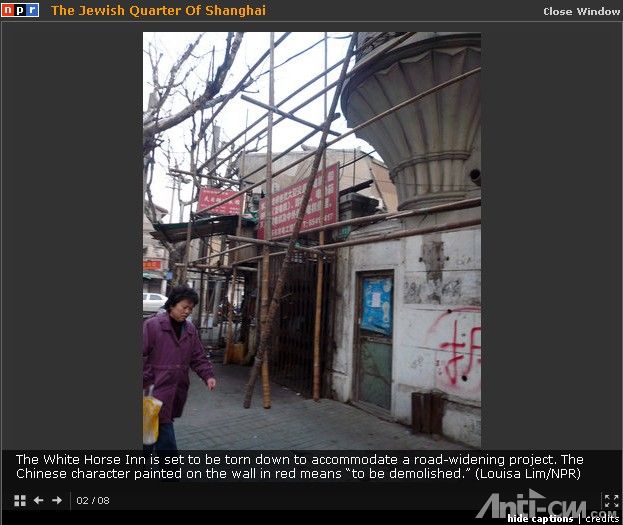
As they start work, the demolition crews are uncovering layers of the past, like unwitting architectural archaeologists. By knocking down shop facades, old shop signs beneath are revealed, like one for Wuerstel Tenor, a sandwich shop, which had been covered for decades.
当拆房工人们开始动工的时候,他们就成了一批并不知情的建筑考古学家,层层剥开一段尘封的历史。把这些店面结构的前面部分敲掉以后,古老的店牌得以重见天日,正如Wuerstel Tenor,一家三明治店在尘封了十几年后终被发现一样。
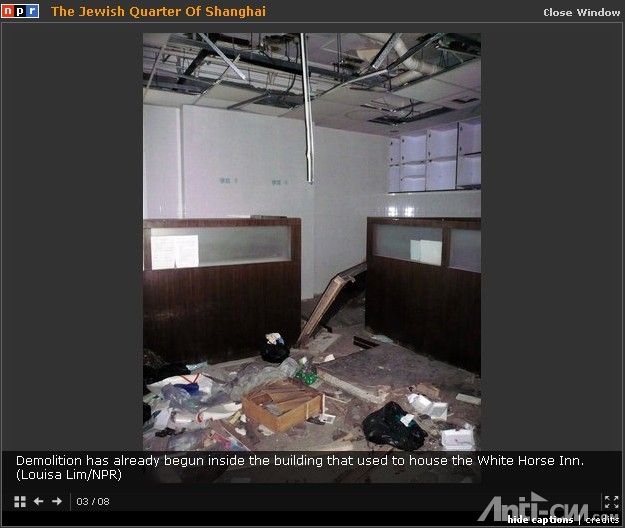
They will pull down other fading shop fronts at the heart of Little Vienna, as well — those of Cafe Atlantic and Horn's Imbiss-stube (Horn's Snack Bar).
工作人员还将拆除位于小维也纳中心区域的其他陈旧的店铺正前门,大西洋咖啡厅和Horn's Snack Bar的前门也不例外。
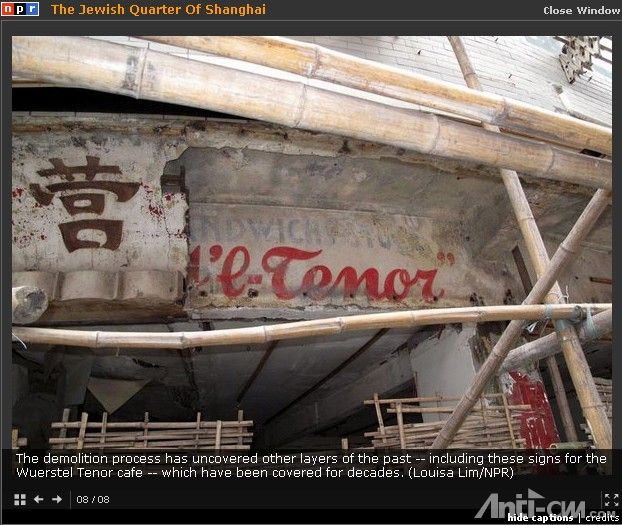
"The existing refugee coffee shops [and] restaurants were a shining light in the lives of the refugees, who did not know how long their isolation and misery would last, should they survive," says Rena Krasno, who has written about her experiences living through World War II in Shanghai.
“这些保留至今的难民咖啡店(以及)餐厅是当年犹太难民们生活中的一盏明灯,他们不知道自己即便能活下来,隔离何时才能解除、苦难还将持续多久。” Rena Krasno说。她曾撰写了一本书,描述自己如何在二战时期的上海如何生存下来的亲身经历。
"In these eateries, they felt they were back in Europe … and for a short time eliminated their painful fate from their minds," she says.
“在吃的方面,他们感觉自己仿佛回到了欧洲……并且在较短的一段时间里,这消除了他们心中对于自身命运的感伤。”
Dvir Bar-Gal is an Israeli journalist who is writing a book about Shanghai's Jewish past. He also leads tours around the Jewish quarter. For him, the question is how important it is for a society to keep its past. If the demolitions go ahead, he fears there will be less and less to show visitors, and he fears the little-known story of Shanghai's Jewish past will be in danger of being completely forgotten.
Dvir Bar-Gal 是一名以色列的记者,日前正在写一本有关在沪犹太难民历史的书籍。他也是这片犹太人区的导游。在他看来,问题在于保留一个社会的过去有多么重要。如果拆除工程继续,他担心将来能呈现给参观者看的东西越来越少,他还担心,犹太难民在上海的那段本已鲜为人知的往昔,将有被彻底遗忘的危险。
"People will stop coming. There will be no interest in the almost forgotten story of the 1940s, the people who were saved here from the Nazis," he says.
“人们不会再来了。对于几近被遗忘的40年代故事,那些曾经逃离纳粹在此避难的人们的故事,将不再有人关心。”他说。
Preserving History Difficult, Unpopular
保留历史很难,不受欢迎
In 2005, the Chinese government declared 70 acres of the Jewish ghetto a conservation zone. The White Horse Inn and buildings slated for demolition are inside that zone, but aren't designated protected buildings.
2005年,中国政府宣称70英亩犹太人聚居区为保护区。因被拆除而受责怪的白马旅馆和其它建筑在这个区域内,但未被指定是受保护的建筑。
Ruan Yisan, a professor at Tongji University in Shanghai, oversaw the designation of the conservation zone three years ago. Yet he had no idea about the demolitions until alerted by NPR. After visiting the area, he vowed to take action.
Ruan Yisan,上海同济大学教授,3年前负责保护区的制定。但在美国国立公共电台(National Public Radio, NPR)提醒之前他对拆除全然不知。考察完该区域,他立誓要采取行动。
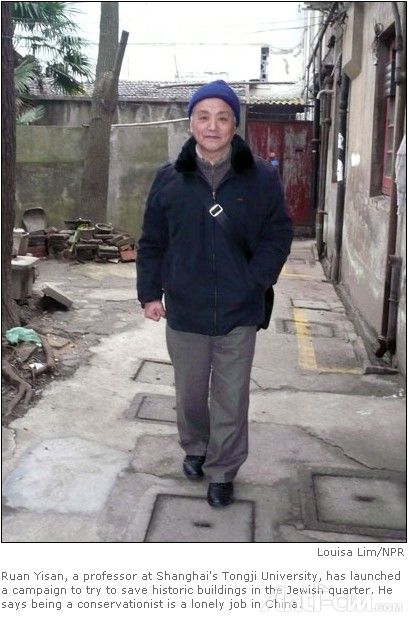
"I'll start making appeals to see what options there are," he says. "These are important historical sites in the conservation zone. If you knock them down, it will never recover."
“我要开始呼吁有没有其它的办法。”他说,“这些是保护区内重要的历史遗迹。如果你拆掉它们,它将永远不能恢复。”
But the professor notes that preserving history is difficult — and unpopular — in China.
但教授指出保留历史很难——而且不受欢迎——在中国。
"Normal people all want these buildings knocked down, the government wants to knock them down, the developers want to knock them down. It's only us conservationists who want to keep them."
“普通人全都希望这些楼被拆掉,政府希望拆掉它们,发展商希望拆掉它们。只有我们这些保护主义者希望保留它们。”
Officials Try To Strike Balance
政府试图公正处理
For local government officials in Shanghai, the case is a classic example of the challenge they face in balancing the city's modernization with conservation of its past. But Cheng Jun from the Hongkou district urban planning and management bureau says the demolitions are necessary to form part of a larger road network.
对于上海市政府官员而言,这次的事件算得上是考验他们如何在建设现代化与保护历史之间找到平衡点的典范。不过来自虹口区城市规划管理局的程军(音译)认为,为了建成一个更为发达的公路网,这次拆除是势在必行的。
"In the future, the amount of traffic will be far greater. And we must build roads for that, otherwise the traffic in the city center will be a catastrophe," he says.
“将来,车流量会大大增加。为此,我们必须修建公路,否则市中心的交通出行将会是一场灾难。”他说。
"When we drew up the conservation zone, we decided then to widen this particular road, as the impact would be relatively small."
“当我们在拆除这片保护区的时候,我们决定只把这条马路拓宽,这样受到的影响就会相对低一些。”
Another official, Chen Jian from the Hongkou district government, emphasizes that many other historic buildings, dating back to the time of the Jewish ghetto, still remain, including the Ohel Moshe Synagogue, which has become the Shanghai Jewish Refugees Museum.
另一位来自虹口区政府的官员陈建(音译)则强调说,在犹太人区尚存的时期的许多历史建筑被保存至今,其中就包括摩西会堂,即今天的上海犹太人避难博物馆。
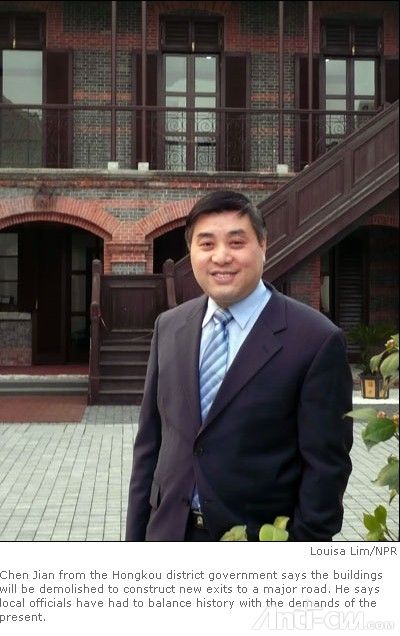
"We'll do our best to remove and save some of the most valuable artifacts, if feasible," he says. "But that's not to say that we won't demolish these buildings."
“我们会尽我们所能移动和保留这里部分最有价值的艺术品,如果办得到的话,” 他说。“但是这并不等于说我们不会拆了这些建筑。”
Vanishing Without A Trace?
消失得一干二净?
That decision will not be welcomed by Gary Matzdorff, an 83-year-old refugee who now lives in California. He remembers the White Horse Inn clearly, because his father went there every afternoon to sip coffee and chat.
Gary Matzdorff,一位现年83岁、居住在加利福尼亚州的老人,显然不会答应这样的决定。他清晰地记得那座白马旅馆,因为那是他父亲当年每天下午都要去小酌和聊天的地方。
"I'm very saddened to hear that it's really going to be demolished," he says. "It's not a happy thought that this area is going to be destroyed for the purpose of so-called progress."
“当得知这里真的将要被拆除的时候,我非常地难过。”他说道,“一想到这个区域会为了所谓的发展而被毁掉,心里就很不愉快。”
Back in 1983, one former refugee, Fred Marcus, returned to Shanghai. His first reaction, noted in his diaries, which have just been published posthumously, was shock.
1983年,此前的一位犹太难民Fred Marcus重返上海。在他死后出版的日记中,记录着他当时的第一反应,就是震惊。
"It was as if we had never been there!" he wrote. "More than 20,000 people vanished without a trace!"
“就像是我们从未来过这里一样!”他写道,“20000多人就这么消失得一干二净!”
His initial confusion was due to the rundown nature of the area, rather than demolitions. But his words now sound like a prediction, as building for China's future obliterates its past.
他最初的困惑在于这个地区越来越不受重视,而非拆除。但他的话现在听起来像是个预言——中国未来的建设正在抹煞它的过去。
============================
信源来自网友lovepuppy 对原报道的简要摘译:
美国国立公共电台报犹太人上海聚居区被拆,别有用意
http://bbs.m4.cn/thread-140224-1-1.html
|
|